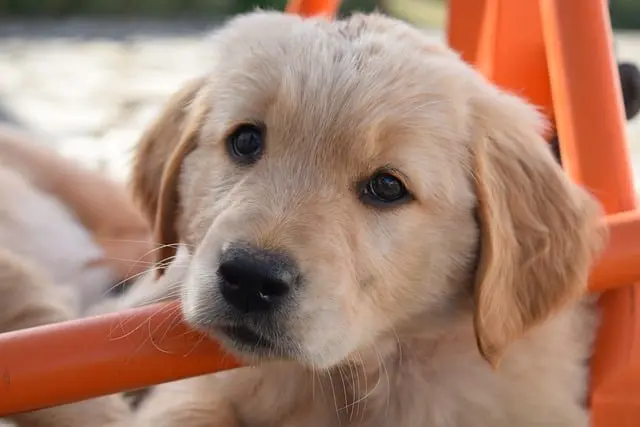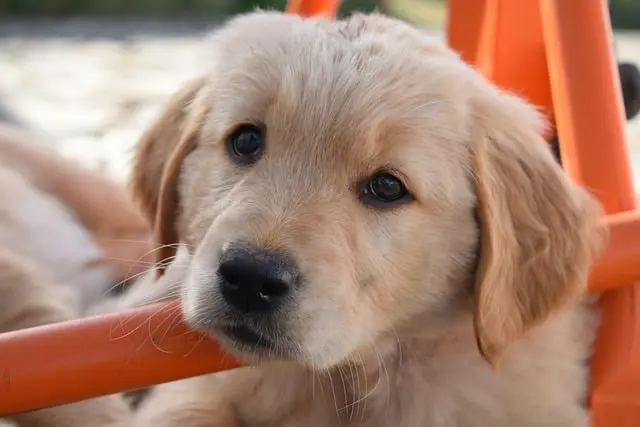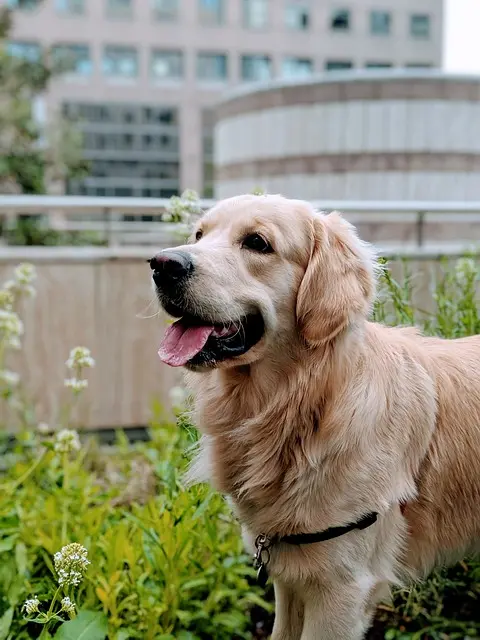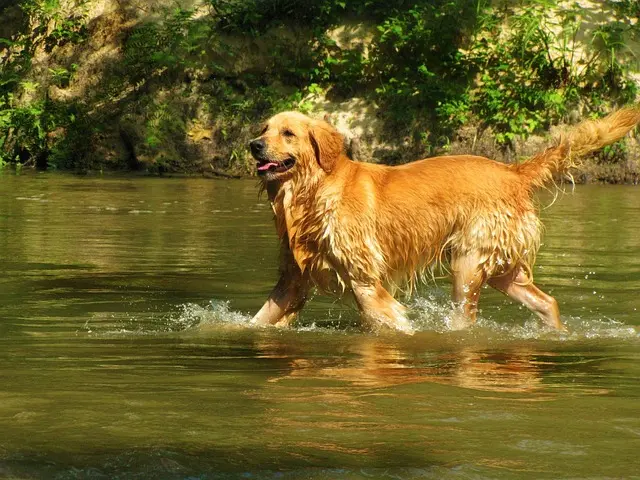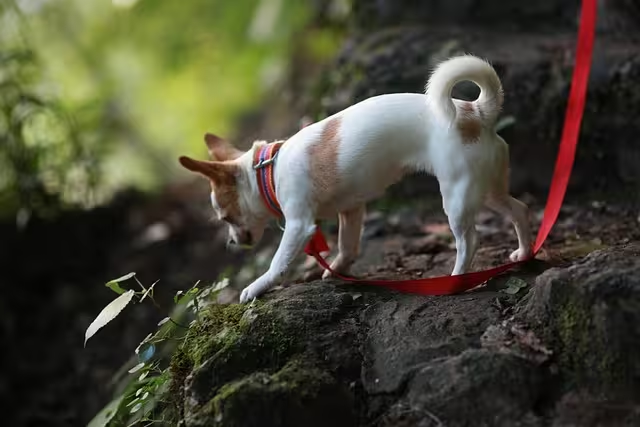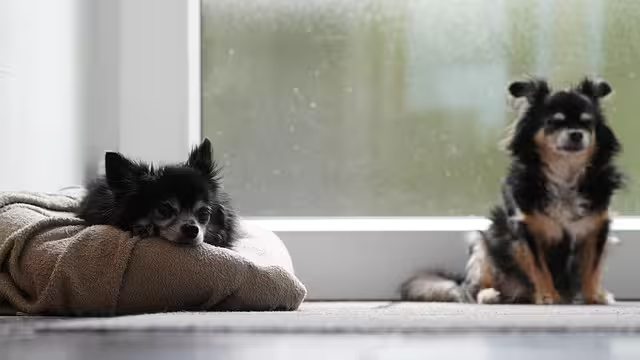Golden Retriever puppies are known for their friendly and affectionate nature, making them one of the most popular dog breeds worldwide· However, to ensure these puppies grow into well-behaved adult dogs, early training and socialization are essential· This blog will explore the significance of starting training and socialization early in a Golden Retriever puppy’s life, discussing the benefits, techniques, and best practices for fostering a well-adjusted adult dog·
1· The Importance of Early Training
A· Establishing Good Behavior
Training your Golden Retriever puppies from an early age is crucial for establishing good behavior patterns· Puppies are like sponges, absorbing information and learning from their experiences· By starting training early, you can instill positive behaviors and prevent undesirable habits from developing· For instance, teaching basic commands such as “sit,” “stay,” and “come” lays a strong foundation for obedience and creates a harmonious relationship between the puppy and its owner·
B· Building a Trusting Relationship
Early training fosters a strong bond of trust and respect between the puppy and its owner· Golden Retriever puppies are eager to please, and positive reinforcement techniques such as treats, praise, and affection can help strengthen this bond· When puppies learn that following commands leads to rewards, they become more motivated to listen and collaborate with their owners· This mutual trust is vital for effective communication and long-term success in training·
C· Preventing Behavioral Issues
Many behavioral issues in adult dogs stem from a lack of training during their formative months· Golden Retriever puppies are energetic and curious, which can lead to unwanted behaviors if not appropriately managed· Early training helps prevent problems such as excessive barking, chewing, jumping, and digging by teaching the puppy what is expected of them· Addressing these behaviors early on can save owners frustration and heartache in the future·
2· The Role of Socialization
A· Understanding Socialization
Socialization is the process of exposing your Golden Retriever puppies to various environments, people, and other animals· It is a crucial aspect of their development, as it helps them learn how to interact appropriately with the world around them· A well-socialized puppy is more likely to grow into a confident and adaptable adult dog·
B· Reducing Fear and Anxiety
Early socialization plays a significant role in reducing fear and anxiety in dogs· Puppies that are not exposed to different experiences may become fearful or aggressive when encountering new situations later in life· For Golden Retriever puppies, socializing with various people, pets, and environments can help them develop a positive attitude toward new experiences and reduce the likelihood of fearful behavior· This proactive approach helps prevent issues such as fear-based aggression or anxiety disorders·
C· Enhancing Confidence
A well-socialized Golden Retriever puppies will develop confidence in various settings· By introducing them to different sights, sounds, and smells during their critical development period (approximately 3 to 14 weeks of age), owners can help their puppies become more adaptable and open-minded· This confidence will serve them well throughout their lives, allowing them to navigate new situations with ease·
3· Best Practices for Training and Socialization
A· Start Early
Begin training and socialization as soon as you bring your Golden Retriever puppies home· The earlier you start, the better the results· Puppies are most receptive to learning during their critical development period, so take advantage of this time to establish a solid foundation·
B· Use Positive Reinforcement
Positive reinforcement is the most effective training method for Golden Retriever puppies· Reward good behavior with treats, praise, and affection to encourage them to repeat those actions· This approach not only makes training enjoyable for your puppy but also strengthens the bond between you·
C· Create a Socialization Plan
Develop a socialization plan that includes exposure to various environments, people, and other animals· Take your puppy on walks in different neighborhoods, visit dog parks, and invite friends and family over to meet your puppy· The more diverse experiences you provide, the better equipped your puppy will be to handle new situations as an adult·
D· Enroll in Puppy Classes
Consider enrolling your Golden Retriever puppies in puppy training classes· These classes provide an excellent opportunity for socialization and structured training in a controlled environment· They also allow your puppy to interact with other dogs, helping them learn essential social skills while under the guidance of professional trainers·
E· Be Patient and Consistent
Training and socialization require patience and consistency· Keep training sessions short and engaging to maintain your puppy’s attention· Consistently reinforce commands and desired behaviors, and remember that every puppy learns at their own pace· Celebrate small victories and stay positive throughout the training process·
4· Benefits of Early Training and Socialization
A· A Well-Behaved Adult Dog
The most significant benefit of early training and socialization is the development of a well-behaved adult dog· Golden Retrievers that receive proper training and socialization are more likely to exhibit good manners, follow commands, and interact positively with people and other animals·
B· Enhanced Quality of Life
A well-trained and socialized Golden Retriever will enjoy a better quality of life· They will be more confident and adaptable, enabling them to participate in various activities and adventures with their owners· This enhanced quality of life benefits both the dog and the owner, as it leads to more enjoyable experiences together·
C· Strengthened Human-Canine Bond
The bond between a well-trained Golden Retriever puppies and its owner is stronger than that of an untrained dog· Training and socialization foster trust, communication, and mutual respect· This bond is crucial for a happy and fulfilling relationship, ensuring a lifelong companionship filled with love and joy·
TRAINING AND SOCIALIZATION FOR GOLDEN RETRIEVER PUPPIES: TIPS FOR HOUSEBREAKING, BASIC COMMANDS, AND LEASH TRAINING
Golden Retriever puppies are renowned for their friendly demeanor, intelligence, and eagerness to please, making them one of the best breeds for training and socialization· However, like any puppy, they require proper guidance from their owners to develop into well-behaved adult dogs· This blog will provide essential tips for housebreaking, teaching basic commands, and leash training, ensuring your Golden Retriever puppies grows up to be a well-mannered companion·
1· Housebreaking: The Foundation of Training
A· Understanding Housebreaking
Housebreaking, or potty training, is one of the first and most critical aspects of training your golden retriever puppies· The goal is to teach your puppy where and when it is appropriate to relieve themselves· This process requires patience, consistency, and positive reinforcement·
B· Establish a Routine
Creating a consistent schedule is key to successful housebreaking· Take your puppy outside first thing in the morning, after meals, and before bed· Additionally, take them out every couple of hours throughout the day, especially after playtime or drinking water· By establishing a routine, your puppy will learn when to expect bathroom breaks·
C· Choose a Designated Spot
Select a specific area outside where you want your puppy to relieve themselves· Use a consistent word or phrase, such as “go potty,” when you take them to this spot· This helps them associate the command with the action, making it easier for them to understand what you expect·
D· Praise and Reward
When your puppy successfully relieves themselves outside, offer immediate praise and a small treat· Positive reinforcement encourages them to repeat the behavior in the future· Conversely, avoid punishing your puppy for accidents indoors; instead, clean up thoroughly and continue to reinforce the desired behavior·
E· Watch for Signs
Pay attention to your puppy’s behavior for signs that they need to go outside· Common indicators include sniffing around, circling, whining, or pacing· If you notice these signs, take your puppy out immediately to prevent accidents indoors·
2· Basic Commands: Building a Foundation of Obedience
A· Importance of Basic Commands
Teaching your golden retriever puppies basic commands is essential for fostering good manners and ensuring safety· Commands like “sit,” “stay,” and “come” lay the groundwork for more advanced training and strengthen the bond between you and your puppy·
B· Teaching “Sit”
Get Their Attention: Start by holding a treat close to your puppy’s nose·
Move the Treat: Slowly move the treat upwards, allowing your puppy to follow it with their eyes· As their head goes up, their bottom will naturally lower to the ground·
Say the Command: When your puppy is in the sitting position, say “sit” and reward them with the treat and praise·
Repeat: Practice this several times until your puppy associates the command with the action·
C· Teaching “Stay”
Start in a Sitting Position: Begin with your puppy in a sitting position·
Introduce the Command: Open your palm in front of them and say “stay·”
Take a Step Back: Take a small step back while keeping your hand open· If your puppy stays in place, reward them with praise and a treat·
Increase Distance: Gradually increase the distance and duration of the stay command, rewarding your puppy each time they successfully remain in position·
D· Teaching “Come”
Use a Leash: Start by putting your puppy on a leash in a quiet area·
Call Them: Crouch down to their level and say “come” in a cheerful tone while gently pulling on the leash·
Reward: When your puppy reaches you, reward them with praise and a treat·
Practice Off-Leash: Once your puppy consistently responds to the command on a leash, practice it in a secure, enclosed area without a leash·
3· Leash Training: Walking with Confidence
A· Importance of Leash Training
Leash training is essential for ensuring that your Golden Retriever puppy walks nicely beside you without pulling· A well-trained puppy will enjoy walks more and will be easier to manage in public spaces·
B· Introduce the Leash Gradually
Before hitting the streets, allow your golden retriever puppies to get used to wearing a collar and leash indoors· Let them walk around the house with the leash attached so they can become familiar with the sensation·
C· Start Indoors or in a Quiet Area
Begin leash training in a quiet area with minimal distractions· Hold the leash firmly, but keep it loose to avoid pulling· Encourage your puppy to walk beside you by using treats as motivation·
D· Use Positive Reinforcement
Whenever your puppy walks beside you without pulling, reward them with praise and treats· If they start to pull ahead, stop walking and call them back to your side· Once they return, continue walking and reward them for staying close·
E· Practice “Heel” Command
To teach your puppy to walk at your side, use the “heel” command· Start walking and say “heel” as you begin· Reward your puppy when they stay close· This command can help maintain their focus and ensure they remain beside you during walks·
F· Gradually Increase Distractions
As your puppy becomes more comfortable walking on a leash, gradually introduce distractions by taking them to busier areas, such as parks or neighborhoods· Continue to use positive reinforcement to encourage good behavior in these new environments·
4· Socialization: The Key to a Well-Rounded Dog
A· Importance of Socialization
Socialization is a crucial aspect of raising a well-behaved Golden Retriever puppy· Exposing them to various environments, people, and other animals helps them develop confidence and adaptability·
B· Create Positive Experiences
Introduce your puppy to different people, pets, and environments in a controlled manner· Ensure that these encounters are positive by providing treats and praise during interactions· Avoid overwhelming your puppy; instead, focus on gradual exposure to new experiences·
C· Puppy Classes
Consider enrolling your Golden Retriever puppies in puppy socialization classes· These classes provide structured environments for your puppy to interact with other dogs and people while learning basic commands· Professional trainers can offer valuable guidance and support·
POSITIVE REINFORCEMENT TECHNIQUES THAT WORK BEST FOR GOLDEN RETRIEVER PUPPIES
Golden Retriever puppies are renowned for their friendly and eager-to-please nature, making them one of the most trainable breeds· However, to maximize their potential and ensure they grow into well-behaved adult dogs, it’s crucial to utilize effective training techniques· Among these, positive reinforcement stands out as one of the best methods for training Golden Retriever puppies· In this blog, we will explore the principles of positive reinforcement and share techniques that work particularly well for this lovable breed·
1· Understanding Positive Reinforcement
Positive reinforcement is a training method that involves rewarding desirable behaviors to encourage their repetition· This approach is based on the principle that behaviors followed by positive outcomes are more likely to be repeated in the future· For Golden Retriever puppies, who thrive on attention and affection, positive reinforcement is particularly effective·
By using treats, praise, and playtime as rewards, you can reinforce good behavior and create a positive learning environment·
2· Why Positive Reinforcement Works for Golden Retrievers
A· Eager to Please
Golden Retrievers are known for their desire to make their owners happy· This inherent trait makes them exceptionally responsive to positive reinforcement techniques· When they receive praise or treats for following commands, they are motivated to repeat those actions in order to gain more rewards·
B· Builds Trust and Bonding
Using positive reinforcement fosters a trusting relationship between you and your puppy· When training is associated with positive experiences, your Golden Retriever will look forward to training sessions and view you as a source of guidance and support· This bond is essential for effective communication and long-term success in training·
C· Reduces Fear and Anxiety
Unlike harsh training methods, positive reinforcement creates a stress-free environment for your puppy· This approach minimizes the risk of fear-based reactions, which can lead to anxiety or aggression· By focusing on rewarding good behavior, you help your Golden Retriever feel secure and confident as they learn·
3· Effective Positive Reinforcement Techniques
A· Use High-Value Treats
When training your Golden Retriever puppies, use high-value treats that they don’t receive regularly· These special treats will motivate them to perform commands and behaviors more eagerly· Small training treats or pieces of cooked chicken, cheese, or commercial dog treats work well· Ensure that the treats are small enough to be consumed quickly so that training sessions can remain fluid·
B· Timing is Key
For positive reinforcement to be effective, timing is crucial· Reward your puppy immediately after they exhibit the desired behavior· This immediate association helps your puppy understand which specific action earned them the treat or praise· For example, if you’re teaching them to “sit,” reward them as soon as their bottom touches the ground·
C· Verbal Praise and Affection
In addition to treats, verbal praise and affection play a significant role in positive reinforcement· Use an enthusiastic tone to praise your Golden Retriever puppy when they follow a command or display good behavior· Phrases like “Good boy!” or “Well done!” combined with petting or cuddling can reinforce their actions effectively· For Golden Retrievers, affection is a powerful motivator·
D· Playtime as a Reward
Golden Retriever puppies are playful by nature, and using play as a reward can be highly effective· After your puppy successfully follows a command or exhibits good behavior, engage them in a brief play session with their favorite toy· This not only reinforces the positive behavior but also capitalizes on their energetic personality·
4· Training Sessions: Keep It Fun and Short
A· Short and Sweet
Golden Retriever puppies have relatively short attention spans, so it’s essential to keep training sessions brief and engaging· Aim for 5 to 10-minute sessions several times a day to maintain your puppy’s interest· Frequent, short sessions will help reinforce learning without overwhelming them·
B· Mix It Up
To keep your puppy engaged, vary the commands and activities during training sessions· Introduce new tricks or commands alongside familiar ones to maintain their enthusiasm· This variety not only keeps training fun but also encourages your Golden Retriever puppies to think critically and stay mentally stimulated·
Conclusion
Training and socialization are critical components of raising a well-behaved Golden Retriever puppies· Utilizing positive reinforcement techniques is the most effective way to encourage desired behaviors while fostering a strong bond between you and your puppy· By using high-value treats, immediate rewards, verbal praise, and play as incentives, you can create a positive and enjoyable training experience·
Remember to keep training sessions fun and engaging to harness your Golden Retriever’s eagerness to learn· With patience and consistency, your puppy will grow into a well-mannered adult dog, ready to share a lifetime of love and companionship· Embrace the journey of training your Golden Retriever puppies, and watch as they flourish into the wonderful companion you’ve always dreamed of!

